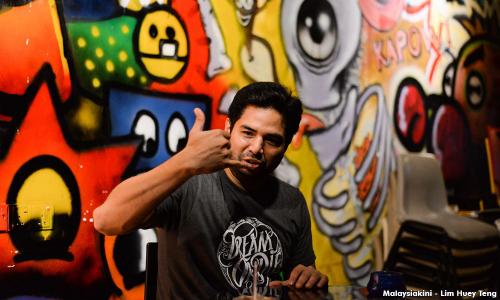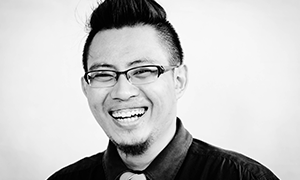The man who built the house of forbidden laughs
MALAYSIANSKINI | In a small shop lot hidden away in the middle of Taman Tun Dr Ismail, Kuala Lumpur, there is a congregation four nights a week, where the sacred and taboo are sacrificed in exchange for earthly pleasures.
Those gathered sit in the dark and listen as one of them bathes in the spotlight, standing against a brick wall and uttering words that most Malaysians dare only say in private or in hushed voices - words too offensive, racist, sensitive, or too vulgar to be said in public, let alone written in a news article.
But despite the shocking and abrasive nature of the words said, there is no anger from those who hear it, only laughter.
Enter the Crackhouse Comedy Club, the premier home for standup comedy in Malaysia.
Nothing is sacred here. Politics, race, religion, sex, all are fair game for the comedians, who don't hold back their punchlines in an effort to make people laugh, not just at others, but also at themselves.
The man behind this is Crackhouse co-founder and comedian Rizal van Geyzel, an Ampang boy of mixed Malay, Chinese and Eurasian heritage.
“(The) van Geyzel (side of the family) comes from a far away place - Batu 9, Port Dickson,” the 34 year-old told Malaysiakini in an interview on Thursday.
Rizal said Crackhouse - which seats about 150 people and attracts both Malaysians and foreigners - was an avenue of escape from censorship.
Audiences have come to get used to unfettered jokes and even expect it from the comedians, he said.
“Back then when we first started you can just say ‘Chinese people are cheap’ and the crowd will (cover their mouths and) go ‘Oooohhh’.
“But now you say ‘Chinese people are cheap’ and the Chinese people will laugh ‘hahaha ya ya ya’,” he said, acting out the laughter of his audience.
Even those who may not appear to be open to such humour have proven otherwise, as related by Rizal in an anecdote involving one of his staff's father.
“(The father) was in full Muslim regalia, a pak haji with a beard, and he came with wife number three.
“He came here and I thought, ‘This is it, Jakim (Islamic Development Department) is here’,” Rizal said.
However after learning that the man was his worker’s dad, Rizal and another comedian - Jonathan Atherton - decided to test how far they could push their boundaries.
“We let go every satire we knew about religion, sex, politics.
“(The father) ended up staying for the whole two-hour show,” Rizal said, adding that the man gave the two a post-show hug and told them that he understood what they were doing.
“As long as there is an understanding between the audience and the comedian that ‘Hey, we’re here just to live in the moment, to enjoy this as just jokes, let’s not get too carried away,’ it works,” he said.
‘Need to laugh about life’
He also said that Malaysians should not take life too seriously, and need to learn to laugh about life especially since there are “many wrongdoings happening right in front of our face”.
He stressed that comedians were not out to topple governments, but only wanted to entertain people.
Dressed casually in a T-shirt and jeans, and smoking rolled up cigarettes, Rizal told Malaysiakini he had wanted to be a comedian since he was eight-years-old.
“I was on the way to school in an army jeep - my dad was in the army - and I asked a friend, ‘What was the Malay word for comedian?’
“He said ‘pelawak’, and I was ‘Oh, okay, I would like to do that for the rest of my life’.”
Rizal finally got his break at the age of 19, after telling jokes during an open mic night at a bar is Pasar Seni.
This caught the attention of celebrity Harith Iskandar, who proceeded to take him under his wing.
Rizal would perform as the opening act for Harith - who was performing for a corporate crowd and also at theatres.
But a lack of life experiences, and concerns about the practicality of being a comedian saw him temporarily abandon this dream as a young adult.
“I was 19, 20. So when the Malaysian Association of Chartered Accountants wanted to hire me - because they couldn’t afford Harith - I would go up on stage and totally bomb (fail).
“I was talking about stuff that had no relation to the white collar crowd, I was 20 years old, what the hell did I know.
“I realised I didn't like what I was saying on stage... I didn't think I had seen enough,” he said.
Quitting comedy altogether, Rizal packed his bags and decided to further the diploma he had earned from Universiti Teknologi Mara (UiTM) and pursue a degree in hospitality from the Johnson and Wales University in Miami, USA - graduating in 2006.
This hiatus however would be not be long-lived.
Getting back on stage
In 2010, two years after he returned to Malaysia and began working as a hotelier, Rizal was invited by fellow budding comedians such as Kuah Jenhan and Andrew Netto to get back on stage.
Although cynical at first, Rizal changed his mind when he saw them perform and made his comeback not long after.
Three years later in 2013, he quit the hotel business altogether to focus full time on comedy, and eventually set up the Crackhouse with three others in 2014 to provide a permanent platform for stand-up comedians.
Now he is busy building up a grassroots movement of comedians, by organising open mic nights every Wednesday, where a cash prize of RM100 is offered to the best performer.
Rizal also seeks to build up the Bahasa Malaysia stand-up scene, and hosts a special show dedicated to Bahasa stand-up comedy at the Crackhouse every first Thursday of the month.
This however is proving to be a serious challenge, with less than 10 people usually turning up for the Bahasa shows, Rizal revealed.
Surprisingly, it is the non-Malays who seem to be enjoying and paying to watch the Bahasa comedy, and not the Malays themselves.
“Sorry la, but the Malays don't appreciate it, man,” he said.
Many Malays he said, prefer sketch comedy, and that it would take some serious star power to make Malays more interested in stand-up comedy performed in their own mother tongue.
There is however a big crowd for their Arabic ‘Yalla Comedy’ show every second Thursday of the month.
“First time we did it, 90 people came from Libya, Palestine, Syria, Saudi, students, expatriates.
"I don't understand (the Arabic jokes) though. (My girlfriend) Arlene made a joke that we Malays would just sit at the back and go 'amin, amin' (amen, to the jokes)," he said while wiping his cupped hands over his face - a symbolic gesture Muslims do to mark the end of a prayer, usually recited in Arabic.
MALAYSIANSKINI is a series on Malaysians you should know.
Previously featured:
Art for the people - Manjat's work transcends controversy
M'sia's first blind lawyer not losing sight of importance of education
One computer prodigy’s path to activism
Ostracised, yet young animal lover risks all to rescue animals
How a self-taught historian learnt the past through headstones
RM12.50 / month
- Unlimited access to award-winning journalism
- Comment and share your opinions on all our articles
- Gift interesting stories to your friends
- Tax deductable

